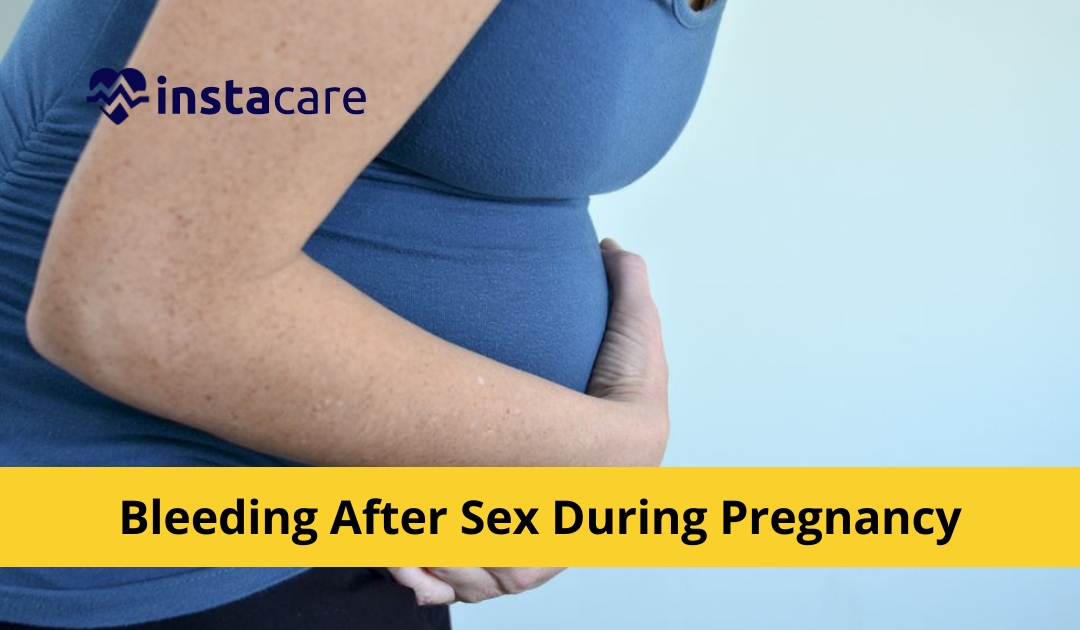Are you pregnant and noticing bleeding after sex? It’s common to have questions about what’s normal during pregnancy. Bleeding isn't typically something you expect or plan for, so it can be concerning when it does happen.
In this blog post, we'll discuss why some pregnancies may cause bloody discharge or spotting in the weeks following intercourse--and how to determine if your experience is considered within the range of “normal.” Read on for more information about what might be causing breakthrough bleeding and why it's important to notify your healthcare provider if any unusual symptoms occur.
What causes bleeding after sex during pregnancy?
Bleeding after sex during pregnancy is a common and generally harmless concern that many pregnant women experience. This can occur for a variety of reasons, typically starting around the second trimester. A common cause is due to increased sensitivity in the cervix, which can be aggravated by intercourse and lead to slight bleeding.
Another potential reason is that during pregnancy, air can become trapped within the birth canal leading to small tears or scrapes along the walls of the wombs when engaging in sexual activity. Bleeding after sex during pregnancy should resolve itself on its own; however if it lasts too long or appears too severe, it’s best to speak with a care provider who will be able to further diagnose any possible underlying issues.
Changes to your cervix
Bleeding after sex can be commonly experienced during pregnancy, and is often caused by changes to the cervix. The cervix, typically the opening of the uterus and a "gatekeeper" protecting your baby from outside infections and bacteria, becomes softer, longer and more swollen as the body prepares for childbirth.
Bleeding can often result from increased pressure on or gentle contact with this sensitive area, which shouldn't be cause for immediate concern or alarm. If you experience bleeding after sex during pregnancy it's best to contact your doctor right away to rule out any other causes.
Implantation
Implantation is a vital part of the conception process. It occurs when a fertilized egg travels from the fallopian tube and attaches itself to the uterus wall. This generally happens about 6-12 days after ovulation, and around the same time that a woman would expect her next period.
Bleeding after sex during pregnancy can occur due to implantation, however it is often light and should not be seen as an indication of a miscarriage or any other complications. If women experience bleeding after sex during pregnancy they should seek medical advice as it can be a sign of infection or other health issues that need to be managed.
Ectopic pregnancy
Bleeding after sex during pregnancy can be a symptom of an ectopic pregnancy, a pregnancy that occurs outside the uterus. Other symptoms may include abdominal or pelvic pain, nausea and vomiting, or lightheadedness or dizziness. If you experience any of these signs or symptoms and are pregnant, it is important to speak with a doctor as soon as possible for diagnosis.
An early diagnosis of an ectopic pregnancy can be critical for the health of both baby and mother. While medical treatments like methotrexate can reduce the need for surgery, timely check-ins with a doctor are key in managing care and addressing health risks.
Vaginal dryness
Vaginal dryness is a common and irritating problem for women of all ages, but it can become particularly difficult to manage during pregnancy. Bleeding after sex during this time is often caused by vaginal dryness and can be easily treated with moisturizers such as ky jelly or replens.
If the bleeding persists, however, it's important to contact your primary care provider right away in order to rule out any other possible conditions that could be causing the symptom. To prevent further irritation, be sure to lubricate regularly with products specifically designed for sensitive skin.
Placenta previa
Placenta previa is an uncommon complication in pregnancy where the placenta is located too low in the uterus, covering all or part of the cervix. Bleeding after sex during pregnancy can be a sign of placenta previa - if you experience this during pregnancy, seek medical advice immediately. While the exact cause of placental previa is unknown, it is believed to be a multi-factorial condition.
The best way to mitigate the risk is to plan for and maintain a healthy pregnancy by following your doctor’s instructions and attending regular prenatal visits. In many cases, placenta previa resolves on its own but if detected in enough time surgery may also be necessary. Ultimately, placenta previa can be a very complex and scary condition - however, with early detection both mother and baby can have positive outcomes.
Early labor
Early labor can be both disruptive and frightening for pregnant women and their families. It is important to understand the risk factors associated with early labor, such as bleeding after sex during pregnancy, as this may be a sign of a serious issue that requires medical attention.
Fortunately, there are many useful treatments available to women who are at risk of or have already experienced early labor. With proper treatment and monitoring by healthcare professionals, women can plan for a healthy full-term pregnancy and delivery.
Miscarriage
Miscarriage is a term referring to the loss of a baby before 20 weeks of pregnancy. It can be a difficult experience for expecting families both emotionally and physically, especially when bleeding accompanies the miscarriage. Bleeding after sex during pregnancy may be an indication of miscarriage, but it can also be caused by other issues such as placenta previa or placental abruption.
It is important to contact your doctor promptly to seek proper medical advice should bleeding ever occur during pregnancy. Counseling resources can also provide emotional support for those who have experienced miscarriages as well as for their partners and family members.
Can you prevent bleeding after sex during pregnancy?
Bleeding after sex during pregnancy can be a concern for many expecting mothers, but there are ways to reduce the likelihood of bleeding. To begin with, abstaining from sex may be the safest option; however, if intercourse is desired and safe for you and your baby as determined by your doctor, then it is important to remember to use proper lubrication for comfort and to avoid unnecessary friction that may cause bleeding.
Additionally, being mindful of any position changes during sex can help prevent bleeding as more vigorous movements could potentially cause bleeding. Regular check-ups with your doctor will also serve as a helpful reminder on any activity that should be avoided in order to remain safe during pregnancy.
When should i worry about bleeding after pregnancy sex?
Bleeding after sex during pregnancy can be concerning for pregnant women. While bleeding can be caused by many factors, there is usually no need to panic if you experience bleeding after intercourse. However, bleeding after sex during the second and third trimesters of pregnancy should be taken seriously and always reported to your doctor so that they can rule out any potentially serious bleeding issues.
If bleeding is accompanied by cramping, fever, or other unusual symptoms then you should seek medical attention immediately. It’s important to talk to your doctor about any questions or concerns you may have surrounding bleeding after sex during your pregnancy as it will help ensure the safety of both you and your baby.
Treatment for bleeding after sex
If you experience bleeding after sex during pregnancy, it is important to seek medical treatment. Bleeding can be indicative of a number of different issues, such as an infection or placenta previa.
During your visit with a healthcare professional, they may need to complete a pelvic exam, take blood or urine samples for testing, or perform a transvaginal ultrasound – all measures aimed at determining the source and severity of the bleeding. Early intervention for bleeding after sex during pregnancy is essential in ensuring that any potential complications are recognized and cared for quickly.
Conclusion
In conclusion, there is no one-size-fits-all answer when it comes to bleeding during pregnancy. It largely depends on the individual, lifestyle factors and even the stage of pregnancy you’re in. In some cases, bleeding can be a sign of something more serious that requires immediate medical attention. However, bleeds experienced during sex are generally harmless and normal and nothing to be overly concerned about unless they persist or become heavy.
Being aware of all the common pregnancy symptoms can help put your mind at ease when you experience them—it’s always best to seek advice before dismissing something as minor in case further action is needed for the sake of both mother and baby!
Please book an appointment with the best Gynecologist in Lahore, Karachi, Islamabad, and all major cities of Pakistan through InstaCare, or call our helpline at 03171777509 to find the verified doctor for your disease.
Source: https://instacare.pk/blog/bleeding-after-sex-during-pregnancy-is-it-normal












